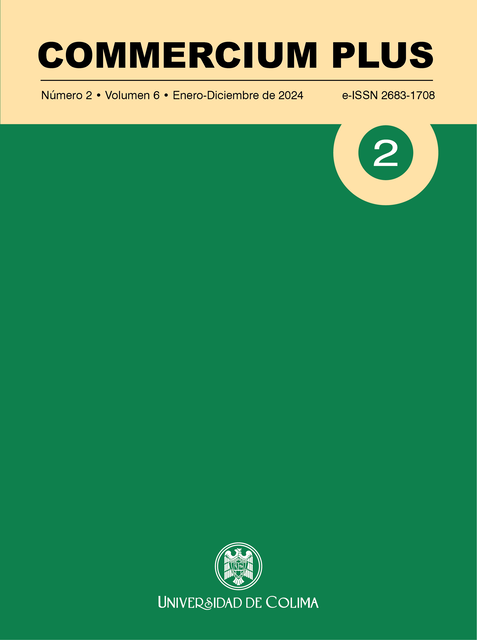The existence of hidden intermediaries in the transfer of goods and its repercussions for Foreign Trade
DOI:
https://doi.org/10.53897/RevCommerP.2024.06.12Keywords:
hidden intermediaries, foreign trade merchandise transport, increased service costs, concomitant positive aspectsAbstract
The objective of this article is to determine the implications of the existence of hidden intermediaries in the transfer of foreign trade goods; it is based on the theory of outsourcing. The information that supports the research was obtained through a survey, applied to the 35 transport companies in Manzanillo. The existence of hidden intermediaries is a reality that cannot be denied; although it could imply the increase in the price of implied service, it
is an additional cost that the market in general can absorb. Eventually, all those involved in operations with hidden intermediaries obtain a benefit: the importer obtains the necessary transport for his goods, the first-contact auto transporter obtains an income, and the hidden intermediary obtains another.
Downloads
References
Basualdo, V., & Morales, D. (2014). La tercerización laboral. Argentina: Siglo Veintiuno Editores.
Boske, L., & Harrison, R. (1995). U.S.-Mexico Trade and Transportation: Corridors, Logistics Practices, and Multimodal Partnerships. Estados Unidos: The University of Texas.
Cant, M., & Jeynes, L. (1998). What Does Outsourcing Bring You That Innovation Cannot? How Outsourcing is Seen-and Currently Marketed-as a Universal Panacea. Total Quality Management, 9(2y 3), 193-201. https://doi.org/10.1080/0954412989054 DOI: https://doi.org/10.1080/0954412989054
Carter, R. (2023). La Lista Definitiva de Estadísticas de Subcontratación (2024). Obtenido de https://findstack.com/resources/outsourcing-statistics
Foro Económico Mundial. (2011). The Global Competitiveness Report 2011/2012. Ginebra, Suiza: Foro Económico Mundial.
López, E., de la Cruz, A., Magaña, P., Ríos, L., & Lino, J. (2019). Problemáticas de las Empresas del
Autotransporte de Mercancías Peligrosas del Puerto de Manzanillo, Colima (2018). Commercium Plus, 3(1), 41-55.
Stojanovi, D., & Aasb, B. (2015). Transport Outsourcing and Transport Collaboration Relationship - The DOI: https://doi.org/10.5937/sjm10-6676
Risk Hedging Perspective. Serbian Journal of Management, 33-49. https://doi.org/10.5937/sjm10-6676 DOI: https://doi.org/10.5937/sjm10-6676
Yu, L. (2011). Logistics Barriers to International Operations: A case study of Japanese firm in China.
International Conference on Economics and Finance Research. IACSIT.
Zamora, A., & Pedraza, O. (2013). El transporte internacional como factor de competitividad en el comercio exterior. Journal of Economics, Finance and Administrative Science, 18(35), 108-118. https://doi.org/10.1016/S2077-1886(13)70035-0 DOI: https://doi.org/10.1016/S2077-1886(13)70035-0
Downloads
Published
How to Cite
Issue
Section
License
Copyright (c) 2024 Commercium plus

This work is licensed under a Creative Commons Attribution-NonCommercial-ShareAlike 4.0 International License.
COMMERCIUM PLUS permite compartir, copiar y redistribuir el material en cualquier medio o formato; adaptar, remezclar, transformar y construir sobre el material, dando crédito a la obra de manera adecuada y proporcionando un enlace a la licencia, indicando si se han realizado cambios.







